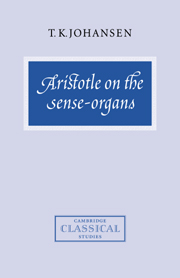1 - Sight
Published online by Cambridge University Press: 22 September 2009
Summary
The argument
This study aims to answer two questions in Aristotle. First, why do we have sense-organs? Second, why are the sense-organs composed the way they are? Aristotle's theory of the sense-organs, I shall argue, is briefly this. We have five so-called special senses: sight, hearing, touch, taste and smell. The five senses are powers or potentialities δυνάµειϚ that animals have to perceive certain objects — for example sight is the power to perceive colour while hearing is the power to perceive sound. The power to perceive a sense-object consists in the ability to be changed by the sense-object. When an animal perceives a sense-object, its sense-faculty is changed by the sense-object so as to become like the sense-object, for example when I see a red pillar box then my faculty of sight becomes red in a certain way. This ability that the sense-faculty has to be changed by a certain sense-object is what defines the sense-faculty, for example the faculty of sight is defined as what has the ability to be changed by colour. The faculty of hearing is defined as what has the ability to be changed by sounds, and so on.
The ability to be changed by a sense-object is something that is only found in matter.
- Type
- Chapter
- Information
- Aristotle on the Sense-Organs , pp. 23 - 115Publisher: Cambridge University PressPrint publication year: 1997

